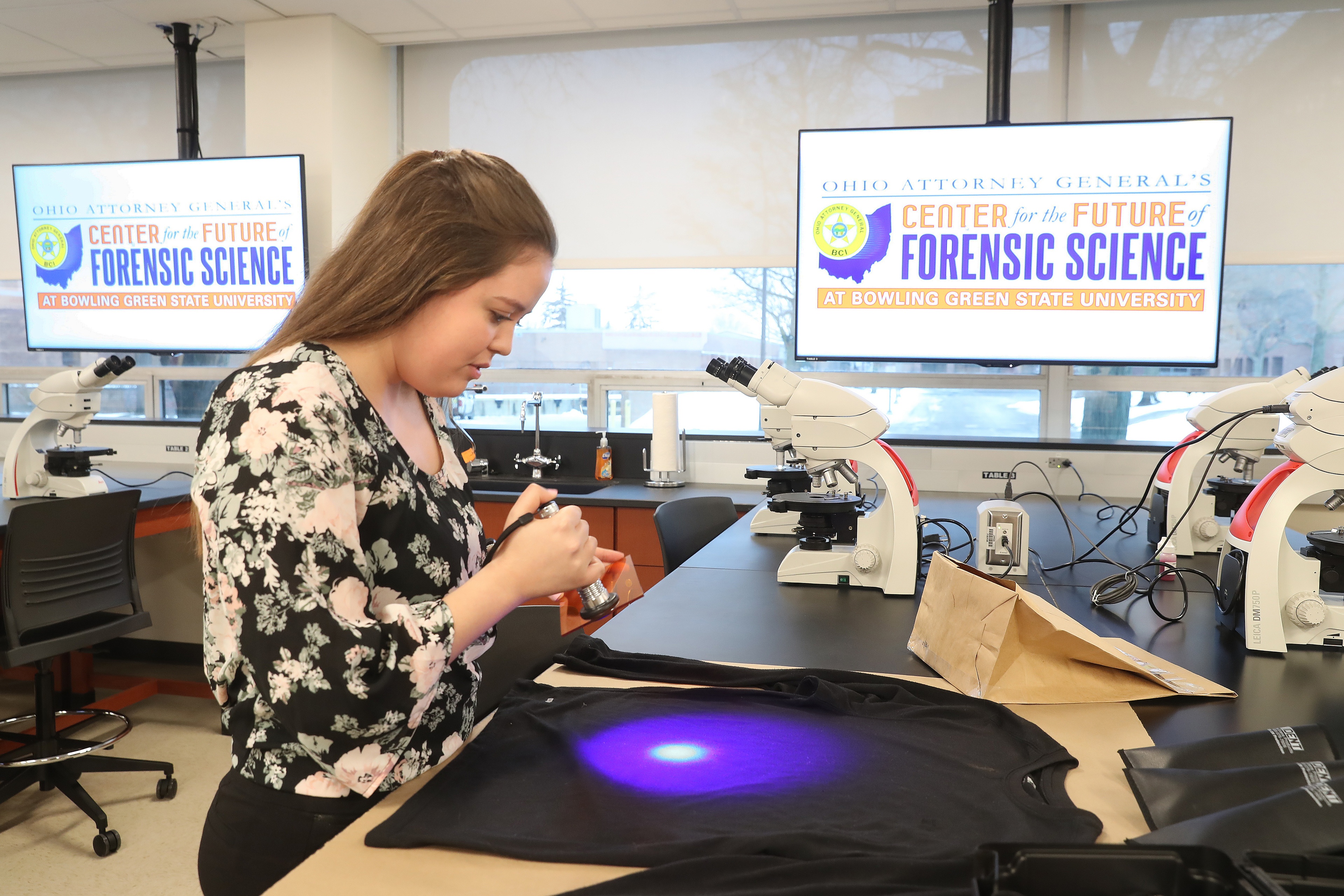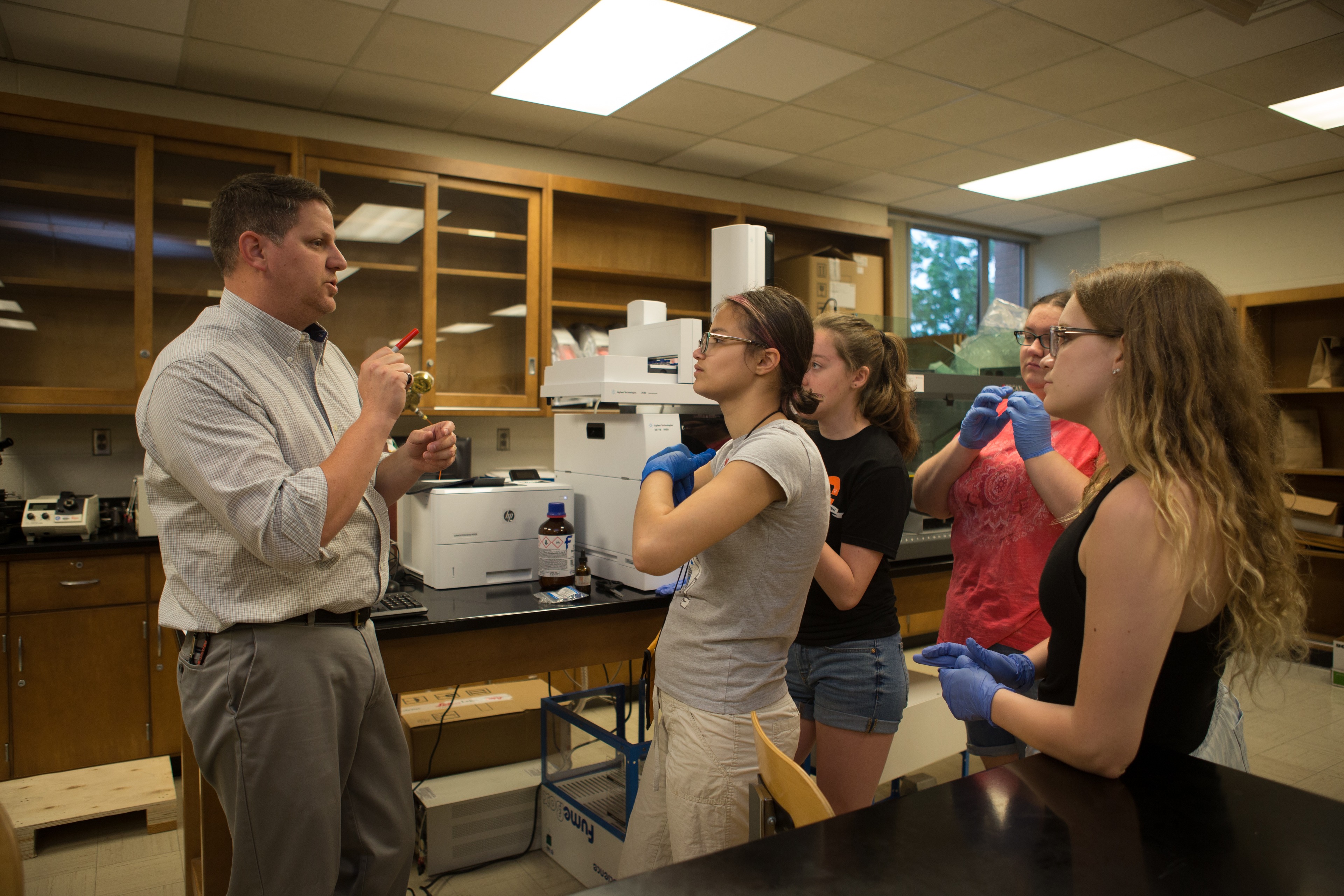Nationally recognized for student experience
The Wall Street Journal

Bachelor of Science (B.S.)
Forensic Science: Forensic DNA Analysis
In the criminal justice world, forensic DNA analysis is a storyteller that reveals truths through the tiniest threads of life – a drop of blood or strand of hair. Prospective students looking for the best school for forensic science choose Bowling Green State University because:
- We have accreditation from the Forensic Science Education Programs Accreditation Commission (FEPAC) – one of just two accredited programs in Ohio.
- We are the only forensic science program in Ohio with a DNA analysis specialization.
- Our campus houses an Ohio Attorney General crime lab and the world-class Center for the Future of Forensic Science.
BGSU stands out nationally for our accredited specialization tracks. Most undergraduate forensic science degree programs are merely general forensics (possibly with generic biology or chemistry tracks). But BGSU offers three in-demand specializations for those pursuing a Bachelor of Science in forensic science.
Forensic science majors must choose one of the following specializations:
- Forensic DNA analysis
- Forensic drug analysis
- Forensic examination
Graduates of the BGSU forensic DNA analysis program have a competitive edge in the career market. Our curriculum keeps pace with current technology, methods and employer expectations for top forensic DNA analyst jobs.
In this interdisciplinary program, students study:
- Biological and chemical foundations for forensic science
- In-field procedures
- Legal and ethical requirements of gathering, analyzing and presenting forensic DNA evidence in court.
Why study forensic DNA analysis at BGSU in Ohio?
- FEPAC accreditation. BGSU has one of the best forensic science programs in the Midwest. We are one of just two programs in Ohio with Forensic Science Education Programs Accreditation Commission (FEPAC) – and the only one with specializations in DNA analysis and forensic examination. FEPAC awards accreditation to forensic science degree programs that meet rigorous standards for curriculum, faculty, facilities and academic support.
- Center for the Future of Forensic Science (CFFS). The BGSU CFFS Lab provides unrivaled hands-on learning. Primary goals include establishing forensic science research and ensuring an education of the highest caliber for future forensic scientists. Since its inception, CFFS faculty have published dozens of peer-reviewed manuscripts and provided 100+ external academic presentations.
- State-of-the-art facilities. Students have access to all the instrumentation of a fully functioning DNA lab. In the DNA analysis specialization, students can even generate their own DNA profile.
- Connect with professionals. BGSU forensic science majors are strongly encouraged to join the Midwestern Association of Forensic Scientists.
- On-campus professional crime lab. The on-campus Ohio BCI laboratory and investigative services center is staffed by professional forensic scientists and law enforcement agents – including several BGSU forensic science adjunct professors who work there full-time.
- Graduate options. BGSU offers an accredited Master of Science in forensic science for those pursuing roles in leadership, research and innovation. Per FEPAC, BGSU has one of two forensic science academic program nationally that offer an accredited accelerated bachelor’s to master’s pathway.
Nationally, BGSU is one of 10 forensic science programs with both undergraduate and graduate accredited forensic science degree programs.
#1 public university in Ohio for career prep
The Wall Street Journal
Career - what can you do with a forensic DNA analysis degree?
Professionals in forensic DNA careers are in high demand. The U.S. Bureau of Labor Statistics forecasts that the job market for forensic science technicians will expand much faster than average for all occupations in the coming years.
Forensic DNA analysis is the science of identifying individuals and factual details by examining unique genetic codes. It is a powerful tool for solving crimes. Using biological samples from skin, hair, saliva or blood cells collected from crime scenes, a forensics DNA analyst can match profiles to suspects, victims or relatives with remarkable accuracy.
A forensic DNA analyst works in diverse settings. They may work at crime scenes and sometimes hospitals. They spend a lot of time in laboratories. They’re also called to court to provide expert testimony.
They’re employed at the local, state and federal level.
- Some are hired by government agencies like the Federal Bureau of Investigations (FBI) or Homeland Security to help solve complex cases.
- Others work at medical examiner’s offices, helping to identify victims or collect crucial evidence.
- A growing number are hired by independent forensic labs and contracted by law enforcement, attorneys and civilians for reliable DNA analysis services.
To excel, precision and attention to detail are non-negotiable. Even small mistakes can have major consequences. Critical thinking and problem-solving are also essential. DNA evidence is usually just one piece of a much larger puzzle. A forensic DNA analyst has to be capable of interpreting the results in the broader context.
They must also be excellent communicators and able to translate seemingly convoluted science and data into clear, understandable information for detectives, attorneys, judges, juries, the media and the general public.
Career paths
- Forensic DNA analyst
- Forensic biologist
- Forensic lab technician
- Forensic scientist
- Serologist
Quick Facts from the Bureau of Labor Statistics
Curriculum
The curriculum for the Bachelor of Science in forensic science with a specialization in forensic DNA analysis provides the core scientific and laboratory problem-solving skills needed for success in modern forensics.
- Learn to apply principles of molecular biology and genetics to analysis of biological fluid evidence.
- Become well-versed in ways to identify, extract, quantify, amplify and analyze DNA evidence.
- Study statistical analysis as applied to the FBI-moderated Combined DNA Indexing System (CODIS) database of convicted offenders.
- Train to effectively answer testimony-type questions to increase jurors’ understanding of forensic DNA analysis.
Required chemistry courses for this specialization also fulfill the requirements for a minor in chemistry.
Upon graduation, a BGSU forensic biologist is capable of:
- Demonstrating critical thinking and decision-making skills based on available case facts when analyzing evidence.
- Using laboratory competence in forensic science, biology and chemistry.
- Implementing strong communication skills necessary for productive members in a team-based analysis approach.
- Completing tasks in a time-efficient manner.
- Complying with FBI education requirements for DNA analysis.
Toward the end of their coursework, forensic science students choose one of three culminating experiences:
- Internship – 200+ hours of hands-on experience in a professional setting
- Research project
- Capstone project – conduct biological and/or chemical analysis as applied to law. The capstone project culminates in a moot court experience in which students provide

Sample courses
- Introduction to Forensic Science
- Molecular Biology
- Forensic Biology
- Forensic DNA Analysis
- Genetics
#1 university in Ohio – big or small, public or private – students would choose again
The Wall Street Journal
Summer Forensic Camp for high school students
BGSU’s virtual summer camp lets you experience what it’s like to be a forensic scientist.
- Classroom, lab and field experiences
- Taught by professionals from our cutting-edge forensic science program (They’ve even been featured on the hit show Forensic Files.)
- A virtual tour through a mock crime scene by a forensic scientist
- Home labs such as fingerprinting, evidence collection, blood typing and more.
The forensic science program is in the BGSU College of Arts and Sciences and affiliated with the Center for the Future of Forensic Science at BGSU.
Accreditation
The BGSU Bachelor of Science in Forensic Science program received full accreditation from the Forensic Science Education Programs Accreditation Commission (FEPAC) in 2022.
Bowling Green State University [BGSU] is accredited by the Higher Learning Commission. BGSU has been accredited by the Higher Learning Commission since 01/01/1916. The most recent reaffirmation of accreditation was received in 2022-2023, with our next reaffirmation of accreditation scheduled for 2032-2033. Questions should be directed to the Office of Institutional Effectiveness.
Request Information
Updated: 10/21/2025 02:20PM

